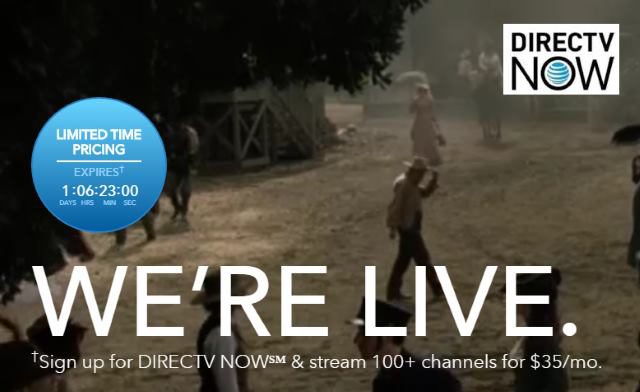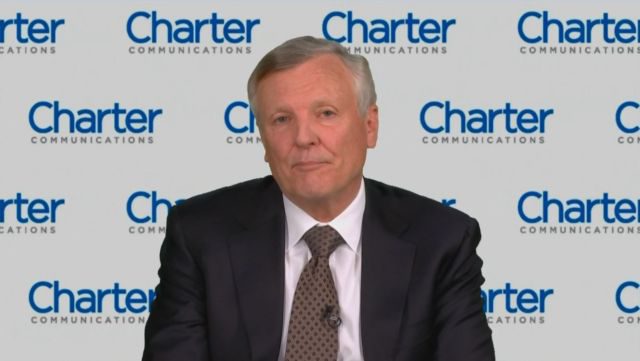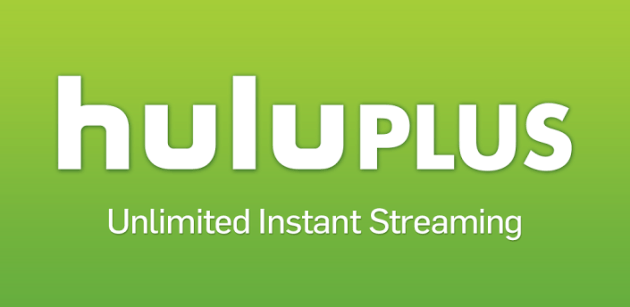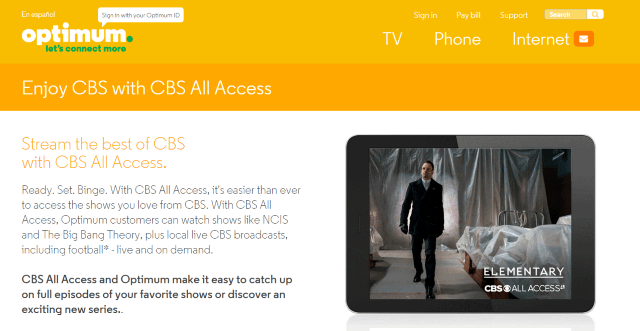 Starting tomorrow, new customers signing up for AT&T’s 100+ channel streaming television package will pay $60 a month, up from the $35 promotional price AT&T has been advertising during the holidays.
Starting tomorrow, new customers signing up for AT&T’s 100+ channel streaming television package will pay $60 a month, up from the $35 promotional price AT&T has been advertising during the holidays.
Today is the last day customers can lock in the $35/month price, and those willing to pay in advance will receive either an Amazon Fire TV Stick (prepay one month) or a 4th generation 32GB Apple TV (prepay three months).
Since launching, DirecTV Now has received mixed reviews. Many customers like the wide range of popular cable channels, and access to HBO and Cinemax for just $5 a month each. But early after launch technical glitches also proved frustrating for many subscribers. Among the most common are cryptic error messages that claim viewers are attempting to stream from outside the U.S. and another that claims customers have too many concurrent streams running. Several app updates have been released to deal with the problems, and complaints seem to be easing.
AT&T hasn’t reported how many customers convert from its free trial to become paying customers, but some analysts remain skeptical if customers without cable television care about a streaming package of linear TV, even at the $35 price point.
Fool.com:
When it first launched, Sling TV seemed like it would be a big hit. That has not proven to be the case possibly because the cord-cutting audience has learned to live without cable and the cord-never folks (people who never had cable in the first place) perhaps don’t miss what they never had.
[…] By putting an end date on this promotion, AT&T can gauge whether enough interest exists in live-streaming television for the company to continue. These are products that seem like a good idea, that have so far been rejected by the marketplace.
That may be because even the top packages from the live-streaming services have holes compared to cable. In most cases they are missing at least some broadcast networks and their interfaces — while not bad for a digital product — are clunky compared to just flipping around with a remote control.
It’s also very possible that cord-cutters and cord-nevers are finding their entertainment elsewhere.

Rutledge: Not worried about the competition
The CEO of Charter Communications continues to consider “cable TV alternatives” like Sling TV and DirecTV Now not much of a threat, because customers appreciate the convenience of having local channels and DVR capability available, and cable operators claim they provide a better set-top box experience.
“I think there’s a lot of reasons why the packages, the big rich packages, will stay together, and why people will continue to pursue their historic [consumer] patterns,” CEO Thomas Rutledge told the annual Citi 2017 Internet, Media and Telecommunications Conference in Las Vegas.
For many ordinary cable TV customers, taking the final step of canceling cable TV has been more psychologically difficult than dropping services like a landline phone because the alternatives available in the marketplace do not yet match the quality and convenience of the cable package.
AT&T apparently also believes a-la-carte cable TV sounds better in theory than practice, considering its marketing efforts have focused on a cable television replacement that most closely resembles traditional cable’s bloated TV lineup. Sling TV’s slim package has not been as successful in the marketplace as some investors had hoped.
For AT&T, there may be more at stake than just a standalone streaming television package. The company announced last week it planned to provide DirecTV Now over its 5G wireless network it plans to test in Austin later this year.
AT&T wants to see how 5G networks manage heavy video streaming traffic, according to a company news release. The development of 5G, which can achieve 14Gbps speeds in lab tests, could be critically important to AT&T’s plan to gradually decommission wired networks in its rural telephone service areas. Should AT&T be able to demonstrate 5G is a more robust replacement for traditional wired communications networks, it could bolster its argument to discontinue wired telephone and broadband service. But it could also mean the eventual end of DirecTV’s costly fleet of satellites in favor of broadband and wireless distribution.
 Former AT&T customers who dumped their former carrier for T-Mobile in return for a free year of DirecTV Now are getting a sweeter deal with a free year of Hulu with Limited Commercials as well.
Former AT&T customers who dumped their former carrier for T-Mobile in return for a free year of DirecTV Now are getting a sweeter deal with a free year of Hulu with Limited Commercials as well.


 Subscribe
Subscribe NBCUniversal has discovered fewer viewers than ever care about live, linear television. Fewer still cared about Esquire Network, the studio’s male-targeted cable network you probably never watched.
NBCUniversal has discovered fewer viewers than ever care about live, linear television. Fewer still cared about Esquire Network, the studio’s male-targeted cable network you probably never watched.

 McAdam originally planned to use Verizon’s acquisition of Yahoo! as a way to broaden the phone company’s content library, but that yet-to-be-finished deal has been in turbulence since media reports exposed major security breaches of Yahoo’s e-mail and portal sites.
McAdam originally planned to use Verizon’s acquisition of Yahoo! as a way to broaden the phone company’s content library, but that yet-to-be-finished deal has been in turbulence since media reports exposed major security breaches of Yahoo’s e-mail and portal sites.

 Starting tomorrow, new customers signing up for AT&T’s 100+ channel streaming television package will pay $60 a month, up from the $35 promotional price AT&T has been advertising during the holidays.
Starting tomorrow, new customers signing up for AT&T’s 100+ channel streaming television package will pay $60 a month, up from the $35 promotional price AT&T has been advertising during the holidays.
